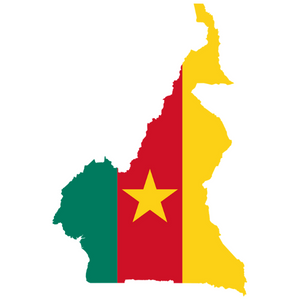Cameroon
Overview
Africa's Miniature, A Land of Diversity and Opportunity
Nestled in the heart of Central Africa, Cameroon is often referred to as "Africa in Miniature" due to its rich cultural, geographical, and climatic diversity. From the sun-kissed beaches of the Atlantic coast to the dense rainforests of the Central region and the arid landscapes of the Far North, Cameroon offers a microcosm of the African continent.
Cameroon's economy is as diverse as its landscapes. Historically reliant on agriculture, with significant exports of cocoa, coffee, and cotton, the country has been making strides in sectors like oil & gas, mining, and telecommunications. Douala, the economic capital, serves as a major port and commercial hub for the Central African region, while Yaoundé, the political capital, is a center of culture, history, and diplomacy.

The nation is a melting pot of over 250 ethnic groups and languages, making it one of the most culturally diverse countries in the world. This rich tapestry of cultures is evident in its music, dance, cuisine, and festivals, which draw influences from its indigenous roots as well as its colonial heritage from both the French and British.
In recent years, Cameroon has been focusing on infrastructural development, digital transformation, and economic diversification. The government's commitment to creating a conducive business environment is evident in its efforts to streamline regulations, promote foreign investment, and develop Special Economic Zones to boost industrialization.
With its strategic location, serving as a gateway to both West and Central Africa, Cameroon is poised for growth and offers a plethora of opportunities for investors and businesses. Its untapped potential, coupled with its diverse resources, makes Cameroon a compelling destination for those looking to make their mark in the African growth story.
Key indicators

Population

GDP per capita

Nominal GDP

Purchasing Power Parity GDP

Main export

Foreign direct investment

Stock market capitalization

GDP growth rate
- Economic Snapshot
- Business Environment
- Startup Ecosystem
- Infrastructure & Technology
- Opportunities & Challenges
- Cultural Insights
Cameroon is a lower-middle-income country in Central Africa. The country is endowed with rich natural resources, including oil and gas, mineral ores, and high-value species of timber, and agricultural products, such as coffee, cotton, cocoa, maize, and cassava.
Cameroon's economy is dependent on oil, which accounts for about 20% of GDP and 60% of government revenue. The country is also a major producer of timber, cocoa, and coffee.
Cameroon's government is committed to economic diversification, and is investing in a number of sectors, including agriculture, manufacturing, and tourism. However, the country's economic growth has been hampered by the COVID-19 pandemic, the war in Ukraine, and the ongoing Anglophone crisis.
Cameroon's business environment is challenging, but there have been some improvements in recent years. The country ranks 142nd out of 190 countries in the World Bank's Ease of Doing Business Index.
The main challenges to doing business in Cameroon include:
- Corruption: Corruption is a major problem in Cameroon. The country ranks 142nd out of 180 countries in Transparency International's Corruption Perception Index.
- Bureaucracy: The Cameroonian bureaucracy can be complex and time-consuming to navigate.
- Infrastructure: Cameroon's infrastructure is underdeveloped, which can make it difficult and expensive to transport goods and people.
- Access to finance: Access to finance can be a challenge for businesses in Cameroon, especially small and medium-sized enterprises (SMEs).
Despite the challenges, Cameroon offers a number of opportunities for businesses and investors. The country has a young and growing population, a rich natural resource base, and a government that is committed to economic reform.
Cameroon's startup ecosystem is still in its early stages of development, but it is growing rapidly. There are a number of startup incubators and accelerators in Cameroon, and the government is providing support to startups.
Some of the most promising sectors for startups in Cameroon include:
- Fintech: Cameroon has a young and tech-savvy population, and there is growing demand for fintech services.
- E-commerce: E-commerce is growing rapidly in Cameroon, as more and more people gain access to the internet and smartphones.
- Agriculture: Cameroon has a large agricultural sector, and there are opportunities for startups to develop new technologies and services to support the sector.
- Education: Cameroon's education system is underdeveloped, and there are opportunities for startups to develop new educational products and services.
Cameroon's infrastructure is underdeveloped, but the government is investing heavily in new infrastructure projects. The government is also investing in the development of Cameroon's digital economy.
Cameroon has a nationwide 4G LTE network, and the government is planning to launch a 5G network in the coming years. Cameroon also has a growing number of internet users, and the government is working to expand internet access to rural areas.
The government is also investing in new transportation infrastructure, such as roads, bridges, and airports. The government is also working to improve Cameroon's energy infrastructure.
The development of Cameroon's infrastructure is essential for economic growth. Better infrastructure will make it easier and cheaper to transport goods and people, and it will also make Cameroon more attractive to foreign investors.
Cameroon offers a number of opportunities for businesses and investors. The country has a young and growing population, a rich natural resource base, and a government that is committed to economic reform.
One of the key opportunities for businesses and investors in Cameroon is in the infrastructure sector. The government is investing heavily in new infrastructure projects, such as roads, bridges, and power plants. This is creating new opportunities for businesses in the construction and engineering sectors.
Another opportunity for businesses and investors in Cameroon is in the non-oil sector. The government is committed to economic diversification, and is investing in a number of sectors, including agriculture, manufacturing, and tourism. This is creating new opportunities for businesses in a wide range of sectors.
However, there are a number of challenges to doing business in Cameroon. The main challenges include:
- Corruption: Corruption is a major problem in Cameroon.
Cameroon is a culturally diverse country with a rich history. The country has over 250 ethnic groups, each with its own language and culture. The two official languages of Cameroon are French and English.
Cameroon's culture is influenced by its African, French, and Islamic heritage. The country is home to a variety of traditional music and dance forms. Cameroon is also known for its arts and crafts, including masks, sculptures, and textiles.
Cameroonians are generally friendly and welcoming people. They are also very proud of their culture and heritage. Businesses and investors who are respectful of Cameroonian culture will likely be successful in the country.
Here are some additional cultural insights for businesses and investors operating in Cameroon:
- Cameroonians place a high value on family and community.
- Cameroonians are generally respectful of authority figures.
- Cameroonians prefer face-to-face meetings to email or phone calls.
- Cameroonians are known for their hospitality.
- Cameroonians are also known for their love of music and dance.
Businesses and investors who understand and respect Cameroonian culture will be better positioned to succeed in the country.
Here are some specific tips for businesses and investors operating in Cameroon:
- Dress appropriately when meeting with Cameroonian business people. Men should wear suits and ties, and women should wear conservative business attire.
- Be prepared to spend time socializing before getting down to business. Cameroonians value relationships, and it is important to build rapport with them before discussing business matters.
- Be patient and understanding. Cameroonians are generally relaxed and easy-going, but they can also be quite shrewd business people. It is important to be patient and to be prepared to negotiate.
- Be honest and transparent. Cameroonians value honesty and transparency in business dealings. Be prepared to be open and honest with them, and to be accountable for your actions.

Investment Landscape & Opportunities in Cameron
- Start-up & SME Investments
- Impact & Green Investments
- Government Bonds & Stock Market
- Public-Private Partnerships
- Foreign Direct Investments
- Commodities & Infrastructure Investments
- Real Estate Development
- Cultural and Creative Industries

Leading
startups in Cameron
Comming up soon

